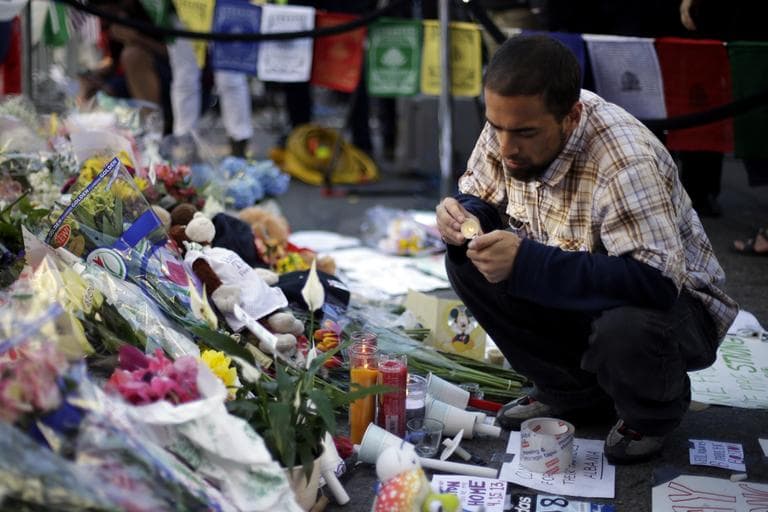Advertisement
Curator Worries About Lost History Of Marathon Memorial Items
Resume
The city of Boston is moving one step closer to normalcy.
The FBI transferred the Boylston Street crime scene over to the city in a brief ceremony Monday evening. While the street will remain closed to traffic and the general public, business owners and residents will be able to return to their offices, shops and homes Tuesday as the cleanup continues.
The Boston Police Department is planning to temporarily relocate the two memorials that have flanked Boylston Street for the past week to a new location in Copley Square Park, but the mayor's office has not decided a permanent location, if any, for the items.
On Monday, the piles of flowers, teddy bears, religious figurines and handwritten notes were moved from the center of Boylston and Berkeley streets to the sidewalk.
In its new location, volunteers organized the memorial. Instead of haphazard tributes laid along the police barricades, the volunteers arranged the items: putting running shoes next to running shoes, baseball hats near other baseball hats, and taping heartfelt notes to the pavement so they would not blow away, all surrounding three white crosses with pictures of the three who died in the attacks.
But Rainey Tisdale, a museum curator who consults with city museums, is concerned that as the city gets back to normal, some of the items that mark the Boston Marathon bombings site will be lost.
"If we don't make some formal plans to preserve these objects as part of the public memory of this event, then they could easily be dispersed to the four winds, they could easily be forgotten," Tisdale said. She hopes there will be a permanent home for these items connected to the race and bombings.
Tisdale says the New England Museum Association has agreed to host a meeting soon to discuss the idea.
"We're against the clock because this stuff will disappear if we don't start moving quickly," Tisdale said. "So it's a question of whether we can mobilize resources soon to save this story before it's lost."
Already some mementos are being lost. Messages written in chalk have been washed away by rain. The flowers are disintegrating. Volunteers who have been watching over the memorials said some medals that runners left have been stolen.
While written and digital records are being collected in city archives and online, there is no long-term plan to preserve the physical items people have left.
"The objects, because they are so emotionally powerful, because they are these symbols, because they are so evocative, they can bring us back to this place, they can bring us back to this week much better than the written record ever can," Tisdale said.
Part of the problem is that there is no local museum that is a logical place for the items. Finding a permanent home would take staff with expertise in preserving three-dimensional objects, as well as space to store and eventually exhibit them.
This program aired on April 23, 2013.
